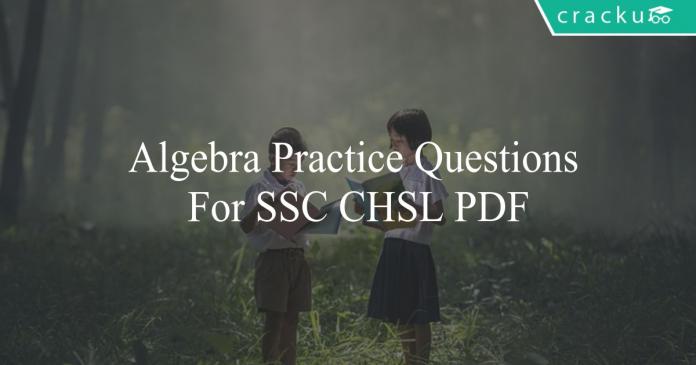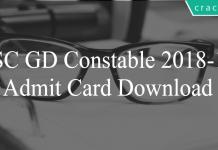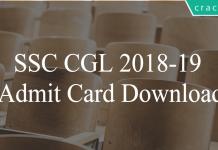Algebra Practice Questions For SSC CHSL PDF
SSC CHSL Algebra Practice Questions download PDF based on previous year question paper of SSC exams. 20 Very important Algebra Practice questions for SSC CHSL Exam.
Download Algebra Practice Questions For SSC CHSL PDF
Take a free mock test for SSC CHSL
Download SSC CHSL Previous Papers
Question 1: Find the value of $1+\Large\frac{1}{1+\frac{1}{1+\frac{1}{2}}}$
a) $\large\frac{6}{5}$
b) $\large\frac{8}{5}$
c) $\large\frac{8}{7}$
d) $\frac{7}{6}$
Question 2: Find the value of $1+\Large\frac{1}{1+\frac{1}{1+\frac{1}{6}}}$
a) $\large\frac{17}{5}$
b) $\large\frac{19}{6}$
c) $\large\frac{20}{13}$
d) $\frac{17}{13}$
Question 3: Find the value of $1+\Large\frac{1}{1+\frac{1}{1+\frac{3}{2}}}$
a) $\large\frac{13}{5}$
b) $\large\frac{17}{6}$
c) $\large\frac{17}{5}$
d) $\frac{12}{7}$
Question 4: Find the value of $\sqrt{3\sqrt{3\sqrt{3……}}}$
a) 9
b) 3
c) 27
d) 1.2
Question 5: Find the value of $\sqrt{4\sqrt{4\sqrt{4……}}}$
a) 4
b) 2
c) 16
d) 8
SSC CHSL Study Material (FREE Tests)
Question 6: Find the value of $\sqrt{7\sqrt{7\sqrt{7……}}}$
a) $\sqrt{7}$
b) 49
c) 7
d) 2.64
Question 7: Find the value of $\sqrt{6+\sqrt{6+\sqrt{6+……}}}$
a) 9
b) 3
c) 27
d) 16
Question 8: Find the value of $\sqrt{30+\sqrt{30+\sqrt{30+……}}}$
a) 12
b) 15
c) 6
d) 18
Question 9: Find the value of $\sqrt{42+\sqrt{42+\sqrt{42+……}}}$
a) 11
b) 7
c) 6
d) 10
Question 10: Find the value of $\sqrt{20-\sqrt{20-\sqrt{20-……}}}$
a) 8
b) 4
c) 6
d) 10
Question 11: Find the value of $\sqrt{56-\sqrt{56-\sqrt{56-……}}}$
a) 9
b) 8
c) 11
d) 14
Question 12: If $2X+\large\frac{2}{X}$ $= 6$, then find the value of $X^{5}+\large\frac{1}{X^{5}}$
a) 123
b) 121
c) 116
d) 107
Question 13: If $3X+\large\frac{3}{X}$ $= 6$, then find the value of $X^{6}+\large\frac{1}{X^{6}}$
a) 4
b) 3
c) 9
d) 2
Question 14: If a+b = 5 and a-b = 1, Then find the value of ab
a) 4
b) 6
c) 8
d) 12
Question 15: If $(a-b)^{2} = 16$ and $(a+b)^{2} = 36$, then find the value of $\frac{ab}{a+b}$
a) $\frac{5}{6}$
b) $\frac{8}{11}$
c) $\frac{6}{7}$
d) $\frac{7}{6}$
FREE SSC MATERIAL – 18000 FREE QUESTIONS
Question 16: If $x-\large\frac{1}{x}$ $= 3$, then $x^{3}-\large\frac{1}{x^{3}}$ $=$ ?
a) 24
b) 28
c) 36
d) 42
Question 17: Find the value of $1+\Large\frac{1}{1-\frac{1}{1+\Large\frac{1}{1-\frac{1}{7}}}}$
a) $\Large\frac{15}{7}$
b) $\Large\frac{19}{8}$
c) $\Large\frac{20}{7}$
d) $\Large\frac{17}{8}$
Question 18: If a = 48, b = 16, c = -64, then find the value of $\large\frac{a^{3}+b^{3}+c^{3}}{abc}$
a) 176
b) 64
c) 3
d) 12
Question 19: If a = 17, b = -4, c = -13, then find the value of $\large\frac{3a^{3}+3b^{3}+3c^{3}}{4abc}$
a) 3
b) $\frac{3}{4}$
c) 1
d) $\frac{9}{4}$
Question 20: If $(2^{x})(2^y) = 16$ and $(3^{x})(9^y) = 27$, then find (x,y)
a) (4,0)
b) (3,2)
c) (5,-1)
d) (6,-2)
DOWNLOAD APP TO ACESSES DIRECTLY ON MOBILE
Answers & Solutions:
1) Answer (B)
$1+\Large\frac{1}{1+\frac{1}{1+\frac{1}{2}}}$ = $1+\Large\frac{1}{1+\frac{1}{\frac{3}{2}}}$
= $1+\Large\frac{1}{1+\frac{2}{3}}$
= $1+\Large\frac{1}{\frac{5}{3}}$
= $1+\Large\frac{3}{5}$
= $\large\frac{8}{5}$
2) Answer (C)
$1+\Large\frac{1}{1+\frac{1}{1+\frac{1}{6}}}$ = $1+\Large\frac{1}{1+\frac{1}{\frac{7}{6}}}$
= $1+\Large\frac{1}{1+\frac{6}{7}}$
= $1+\Large\frac{1}{\frac{13}{7}}$
= $1+\Large\frac{7}{13}$
= $\large\frac{20}{13}$
3) Answer (D)
$1+\Large\frac{1}{1+\frac{1}{1+\frac{3}{2}}}$ = $1+\Large\frac{1}{1+\frac{1}{\frac{5}{2}}}$
= $1+\Large\frac{1}{1+\frac{2}{5}}$
= $1+\Large\frac{1}{\frac{7}{5}}$
= $1+\Large\frac{5}{7}$
= $\large\frac{12}{7}$
4) Answer (B)
Let $\sqrt{3\sqrt{3\sqrt{3……}}}$ = X
Then, $\sqrt{3X} = X$
Squaring on both sides,
$3X = X^{2}$
⇒ X $= 3$
5) Answer (A)
Let $\sqrt{4\sqrt{4\sqrt{4……}}}$ = X
Then, $\sqrt{4X} = X$
Squaring on both sides,
$4X = X^{2}$
⇒ X $= 4$
6) Answer (C)
Let $\sqrt{7\sqrt{7\sqrt{7……}}}$ = X
Then, $\sqrt{7X} = X$
Squaring on both sides,
$7X = X^{2}$
⇒ X $= 7$
7) Answer (B)
Let $\sqrt{6+\sqrt{6+\sqrt{6+……}}}$ = X
Then, $\sqrt{6+X} = X$
Squaring on both sides,
$6+X = X^{2}$
⇒ $X^{2}-X-6 = 0$
⇒ $X^{2}-3X+2X-6 = 0$
⇒ $X(X-3)+2(X-3) = 0$
⇒ $(X-3)(X+2) = 0$
⇒ $X = 3$ or $X = -2$
X cannot be negative when all the terms are positive.
Hence, $X = 3$
8) Answer (C)
Let $\sqrt{30+\sqrt{30+\sqrt{30+……}}}$ = X
Then, $\sqrt{30+X} = X$
Squaring on both sides,
$30+X = X^{2}$
⇒ $X^{2}-X-30 = 0$
⇒ $X^{2}-6X+5X-30 = 0$
⇒ $X(X-6)+5(X-6) = 0$
⇒ $(X-6)(X+5) = 0$
⇒ $X = 6$ or $X = -5$
X cannot be negative when all the terms are positive.
Hence, $X = 6$
9) Answer (B)
Let $\sqrt{42+\sqrt{42+\sqrt{42+……}}}$ = X
Then, $\sqrt{42+X} = X$
Squaring on both sides,
$42+X = X^{2}$
⇒ $X^{2}-X-42 = 0$
⇒ $X^{2}-7X+6X-42 = 0$
⇒ $X(X-7)+6(X-7) = 0$
⇒ $(X-7)(X+6) = 0$
⇒ $X = 7$ or $X = -6$
X cannot be negative when all the terms are positive.
Hence, $X = 7$
10) Answer (B)
Let $\sqrt{20-\sqrt{20-\sqrt{20-……}}}$ = X
Then, $\sqrt{20-X} = X$
Squaring on both sides,
$20-X = X^{2}$
⇒ $X^{2}+X-20 = 0$
⇒ $X^{2}-4X+5X-20 = 0$
⇒ $X(X-4)+5(X-4) = 0$
⇒ $(X-4)(X+5) = 0$
⇒ $X = 4$ or $X = -5$
Hence, Option B is correct answer.
11) Answer (B)
Let $\sqrt{56-\sqrt{56-\sqrt{56-……}}}$ = X
Then, $\sqrt{56-X} = X$
Squaring on both sides,
$56-X = X^{2}$
⇒ $X^{2}+X-56 = 0$
⇒ $X^{2}-8X+7X-56 = 0$
⇒ $X(X-8)+7(X-8) = 0$
⇒ $(X-8)(X+7) = 0$
⇒ $X = 8$ or $X = -7$
Hence, Option B is correct answer.
12) Answer (A)
Given $2X+\large\frac{2}{X}$ $= 6$
$\Rightarrow 2(X+\large\frac{1}{X})$ $= 6$
$\Rightarrow X+\large\frac{1}{X}$ $= 3$ –> (1)
Squaring (1) on both sides
$(x+\large\frac{1}{x})^{2}$ $= 9$
$\Rightarrow x^{2}+\large\frac{1}{x^{2}}$ $+2\times x\times\large\frac{1}{x}$ $= 9$
$\Rightarrow x^{2}+\large\frac{1}{x^{2}}$ $+2 = 9$
$\Rightarrow x^{2}+\large\frac{1}{x^{2}}$ $= 7$ –> (2)
Cubing (1) on both sides
$(x+\large\frac{1}{x})^{3}$ $= 27$
$\Rightarrow x^{3}+\large\frac{1}{x^{3}}$ $+3\times x\times\large\frac{1}{x}$ $\times(x+\large\frac{1}{x})$ $= 27$
$\Rightarrow x^{3}+\large\frac{1}{x^{3}}$ $+3\times3 = 27$
$\Rightarrow x^{3}+\large\frac{1}{x^{3}}$ $= 27-9 = 18$ –> (3)
Multiplying (2) and (3)
$x^{2}+\large\frac{1}{x^{2}}$ $\times x^{3}+\large\frac{1}{x^{3}}$ $= 18\times7$
$\Rightarrow x^{5}+\large\frac{1}{x^{5}}$ $+x^{2}\times\large\frac{1}{x^{3}}$ $+x^{3}\times\large\frac{1}{x^{2}}$ $= 126$
$\Rightarrow x^{5}+\large\frac{1}{x^{5}}$ $+x+\large\frac{1}{x}$ $= 126$
Substituting $x+\large\frac{1}{x}$ $= 3$ in above equation
$\Rightarrow x^{5}+\large\frac{1}{x^{5}}$ $+3 = 126$
$\Rightarrow x^{5}+\large\frac{1}{x^{5}}$ $= 123$
13) Answer (D)
Given $3X+\large\frac{3}{X}$ $= 6$
$\Rightarrow 3(X+\large\frac{1}{X})$ $= 6$
$\Rightarrow X+\large\frac{1}{X}$ $= 2$
Squaring on both sides
$(x+\large\frac{1}{x})^{2}$ $=4$
$\Rightarrow x^{2}+\large\frac{1}{x^{2}}$+$2\times x\times\large\frac{1}{x}$ $=4$
$\Rightarrow x^{2}+\large\frac{1}{x^{2}}$ $+2 = 4$
$\Rightarrow x^{2}+\large\frac{1}{x^{2}}$ $= 2$
Cubing on both sides
$(x^{2}+\large\frac{1}{x^{2}})^{3}$ $= 8$
$x^{6}+\large\frac{1}{6}$ $+3\times x^{2}\times\large\frac{1}{x^{2}}$ $\times(x^{2}+\large\frac{1}{x^{2}})$ $= 8$
$\Rightarrow x^{6}+\large\frac{1}{6}$ $+3\times2 = 8$
$\therefore x^{6}+\large\frac{1}{6}$ $= 8-6 = 2$
14) Answer (B)
Given, a+b = 5
a-b = 1
Then, 2a = 6 ==> a = 3
Substituting a = 3 in above equation
==> b = 2
Hence, ab = 3*2 = 6
15) Answer (A)
Given $(a-b)^{2} = 16$ and $(a+b)^{2} = 36$
$(a+b)^{2} = (a-b)^{2}+4ab$
$36 = 16+4ab$
=> $4ab = 20$
$ab = 5$
$(a+b)^{2} = 36$
=> $a+b = 6$
Hence, $\frac{ab}{a+b} = \frac{5}{6}$
16) Answer (C)
Given $x-\large\frac{1}{x}$ $= 3$
Cubing on both sides
$x^{3}-\large\frac{1}{x^{3}}$ $-3\timesx\times\large\frac{1}{x}$ $(x-\large\frac{1}{x})$ $= 27$
=> $x^{3}-\large\frac{1}{x^{3}}$ $-3\times3 = 27$
=> $x^{3}-\large\frac{1}{x^{3}}$ $-9 = 27$
=> $x^{3}-\large\frac{1}{x^{3}}$ $= 36$
17) Answer (C)
$1+\Large\frac{1}{1-\frac{1}{1+\Large\frac{1}{1-\frac{1}{7}}}}$ = $1+\Large\frac{1}{1-\frac{1}{1+\Large\frac{1}{\frac{6}{7}}}}$
= $1+\Large\frac{1}{1-\frac{1}{1+\Large\frac{7}{6}}}$
= $1+\Large\frac{1}{1-\frac{1}{\Large\frac{13}{6}}}$
= $1+\Large\frac{1}{1-\frac{6}{13}}$
= $1+\Large\frac{1}{\frac{7}{13}}$
= $1+\Large\frac{13}{7}$
= $\Large\frac{20}{7}$
18) Answer (C)
Given a = 48, b = 16, c = -64
Then, a+b+c = 48+16-64 = 0
We know that if a+b+c = 0, then $a^{3}+b^{3}+c^{3} = 3abc$
Hence, $\large\frac{a^{3}+b^{3}+c^{3}}{abc} = \frac{3abc}{abc}$ $= 3$
19) Answer (D)
Given a = 17, b = -4, c = -13
Then a+b+c = 0.
We know that if a+b+c = 0, then $a^{3}+b^{3}+c^{3} = 3abc$
Then, $\large\frac{3a^{3}+3b^{3}+3c^{3}}{4abc}$ $= \large\frac{3(a^{3}+b^{3}+c^{3})}{4abc} = \frac{3(3abc)}{4abc} = \frac{9}{4}$
20) Answer (C)
Given $(2^{x})(2^y) = 16$
=> $2^{x+y} = 2^{4}$
=> x+y = 4 — (1)
$(3^{x})(9^y) = 27$
=> $(3^{x})((3^2)^y) = 3^3$
=> $(3^x)(3^2y) =3^3$
=> $3^x+2y = 3^3$
=> $x+2y = 3$ — (2)
Solving (1) and (2)
=> y = -1
Substituting y = -1 in (1) –> x = 5
Therefore, (x,y) = (5,-1)





